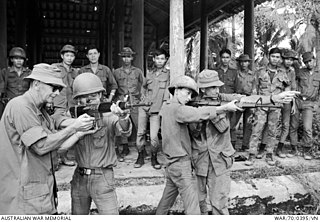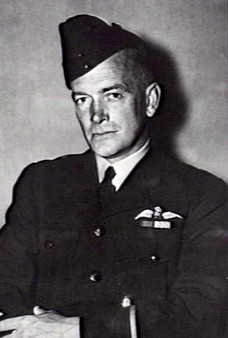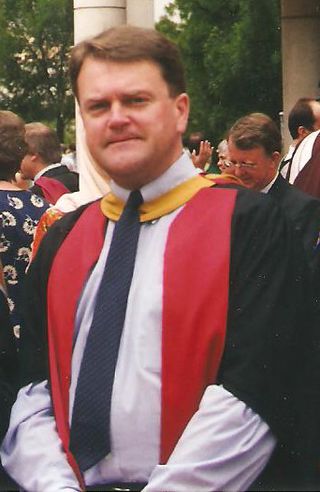Related Research Articles

The Australian War Memorial (AWM) is a national war memorial and museum dedicated to all Australians who died during war. The AWM is located in Campbell, a suburb of the Australian capital of Canberra. The grounds include five buildings and a sculpture garden. Most of the museum galleries and commemorative areas are contained in the Memorial Building.

The Southeast Asia Treaty Organization (SEATO) was an international organization for collective defense in Southeast Asia created by the Southeast Asia Collective Defense Treaty signed in September 1954 in Manila, Philippines. The formal institution of SEATO was established on 19 February 1955 at a meeting of treaty partners in Bangkok, Thailand. The organization's headquarters was also in Bangkok. Eight members joined the organization.

The Australian Army Training Team Vietnam (AATTV) was a specialist unit of military advisors of the Australian Army that operated during the Vietnam War. Raised in 1962, the unit was formed solely for service as part of Australia's contribution to the war, providing training and assistance to South Vietnamese forces. Initially numbering only approximately 30 men, the size of the unit grew several times over the following years as the Australian commitment to South Vietnam gradually grew, with the unit's strength peaking at 227 in November 1970. Members of the team worked individually or in small groups, operating throughout the country from the far south to the Demilitarized Zone (DMZ) in the north. Later they were concentrated in Phước Tuy Province as Australian forces prepared to withdraw from Vietnam. It is believed to be the most decorated Australian unit to serve in Vietnam; its members received over 100 decorations, including four Victoria Crosses, during its existence. The unit was withdrawn from South Vietnam on 18 December 1972 and was disbanded in Australia on 16 February 1973. A total of 1,009 men served with the unit over a period of ten years, consisting of 998 Australians and 11 New Zealanders.

No. 79 Squadron is a Royal Australian Air Force (RAAF) flight training unit that has been formed on four occasions since 1943. The squadron was established in May 1943 as a fighter unit equipped with Supermarine Spitfires, and subsequently saw combat in the South West Pacific theatre of World War II. Between June 1943 and the end of the war in August 1945 it flew air defence patrols to protect Allied bases and ships, escorted Australian and United States aircraft, and attacked Japanese positions. The squadron was disbanded in November 1945, but was re-formed between 1962 and 1968 to operate CAC Sabres from Ubon Air Base in Thailand. In this role it contributed to the defence of Thailand against a feared attack from its neighbouring states and exercised with United States Air Force units. No. 79 Squadron was active again at RAAF Base Butterworth in Malaysia between 1986 and 1988 where it operated Mirage III fighters and a single DHC-4 Caribou transport during the period in which the RAAF's fighter squadrons were transitioning to new aircraft.
The diplomatic history of Australia refers to the historical events surrounding Australian foreign relations. Following the global change in the dynamics of international state of affairs in the 20th century, this saw a transition within Australia's diplomatic situation to broaden outside of exclusively commonwealth and western European nations. Its core relationship was with Great Britain until 1941, and with the United States and New Zealand since then as represented by ANZUS. In the 21st century trade has soared with China. However relations have cycled back and forth from friendly to strained. For recent relations see also Foreign relations of Australia.

Australia in the War of 1939–1945 is a 22-volume official history series covering Australian involvement in the Second World War. The series was published by the Australian War Memorial between 1952 and 1977, most of the volumes being edited by Gavin Long, who also wrote three volumes and the summary volume The Six Year War.

Australia's involvement in the Vietnam War began with a small commitment of 30 military advisors in 1962, and increased over the following decade to a peak of 7,672 Australian personnel following the Menzies Government's April 1965 decision to upgrade its military commitment to South Vietnam's security. By the time the last Australian personnel were withdrawn in 1972, the Vietnam War had become Australia's longest war, eventually being surpassed by Australia's long-term commitment to the War in Afghanistan. It remains Australia's largest force contribution to a foreign conflict since the Second World War, and was also the most controversial military action in Australia since the conscription controversy during World War I. Although initially enjoying broad support due to concerns about the spread of communism in Southeast Asia, an increasingly influential anti-war movement developed, particularly in response to the government's imposition of conscription.

Air Chief Marshal Sir Frederick Rudolph William Scherger, was a senior commander in the Royal Australian Air Force (RAAF). He served as Chief of the Air Staff, the RAAF's highest-ranking position, from 1957 until 1961, and as Chairman of the Chiefs of Staff Committee, forerunner of the role of Australia's Chief of the Defence Force, from 1961 until 1966. He was the first RAAF officer to hold the rank of air chief marshal.
David Murray Horner, is an Australian military historian and academic.
Robert John O'Neill, was an Australian historian and academic. He served as the chair of the International Academic Advisory Committee at the United States Studies Centre at the University of Sydney, was director of the International Institute for Strategic Studies, based in London, from 1982 to 1987, and was Chichele Professor of the History of War at the University of Oxford from 1987 to 2000.

The Ngô Đình Diệm presidential visit to Australia from 2 to 9 September 1957 was an official visit by the first president of the Republic of Vietnam. It was part of a year of travelling for Diệm, who made official visits to the United States and other anti-communist countries. As with his American trip, Diệm was warmly and lavishly received during the height of the Cold War, garnering bipartisan praise from both the Liberal Party of Australia of Prime Minister Robert Menzies and the opposition Australian Labor Party (ALP).
Australia in the Korean War 1950–53 is the official history of Australia's involvement in the Korean War. The series consists of two volumes covering Australia's strategy and diplomacy in the war and the Australian military's combat operations respectively. Both volumes were written by Robert O'Neill, and they were published in 1981 and 1985.
The VC 5th Infantry Division was a division of the Viet Cong during the Vietnam War and later became part of the People's Army of Vietnam.

The Official History of Australian Peacekeeping, Humanitarian and Post-Cold War Operations is the official history of Australia's military and civilian involvement in peacekeeping since 1947 as well as military operations in the years after the end of the Cold War. The series, comprising six volumes, was jointly produced by the Australian War Memorial and Australian National University, with Professor David Horner serving as its general editor.
Australian involvement in the Malayan Emergency lasted 13 years, between 1950 and 1963, with army, air force and naval units serving. The Malayan Emergency was a guerrilla war fought between Commonwealth armed forces and the Malayan National Liberation Army (MNLA), the military arm of the Malayan Communist Party, from 1948 to 1960 in Malaya. The Malayan Emergency was the longest continuous military commitment in Australia's history. Thirty-nine Australians were killed and 27 wounded.

The Official History of Australia's Involvement in Southeast Asian Conflicts 1948–1975 covers Australia's involvement in the Malayan Emergency, Indonesia–Malaysia confrontation and Vietnam War. The series is an official history and was funded by the Australian Government and published by Allen & Unwin in association with the Australian War Memorial. Peter Edwards was appointed the official historian for the series in 1982. The series comprises nine volumes, which were published between 1992 and 2012. A single-volume summary of the series, Australia and the Vietnam War, was published in 2014.

Major General Bruce Alexander McDonald, was a senior officer in the Australian Army, seeing service in the Second World War, the Indonesia-Malaysia Confrontation and the Vietnam War.

Jeffrey Guy Grey was an Australian military historian. He wrote two volumes of The Official History of Australia's Involvement in Southeast Asian Conflicts 1948–1975, and several other high-profile works on Australia's military history. He was the first non-American to become the president of the Society for Military History, but is perhaps best known as the author of A Military History of Australia.

Craig Anthony John Stockings is an Australian historian with research interests in military and defence history. Since 2016, Stockings has been Official Historian and general editor of the Official History of Australian Operations in Iraq and Afghanistan, and Australian Peacekeeping Operations in East Timor, based at the Australian War Memorial in Canberra. Prior to this appointment, Stockings was an officer in the Australian Army and professor of history at the University of New South Wales, Canberra, working out of the Australian Defence Force Academy.
CIA involvement in the Whitlam dismissal is an allegation that the U.S. Central Intelligence Agency (CIA) was involved in the 1975 Australian constitutional crisis, which culminated in the dismissal of Prime Minister Gough Whitlam.
References
- Specific
- ↑ Christ Church Grammar School, Mitre, 1950-1962, http://obafiles.ccgs.wa.edu.au/Mitre/1962-december.pdf
- 1 2 3 4 5 6 7 8 9 10 "Dr Peter Geoffrey Edwards". Who's Who in Australia Online. ConnectWeb. Retrieved 4 April 2017.
- ↑ "Rhodes Scholars: complete list, 1903–2015". Rhodes Trust. Archived from the original on 6 November 2013. Retrieved 4 April 2017.
- ↑ "Professor Peter Edwards". Contemporary Histories at Deakin. Deakin University. Retrieved 21 September 2017.
- 1 2 3 4 5 Dennis, Peter; Jeffrey Grey; Ewan Morris; Robin Prior; Jean Bou. "Official Histories". The Oxford Companion to Australian Military History. Oxford Reference Online. Retrieved 4 April 2017.
- 1 2 3 4 "Official History of Australia's Involvement in Southeast Asian Conflicts 1948–1975". Official Histories. Australian War Memorial. Retrieved 4 April 2017.
- ↑ Murphy 1994 , p. 119
- ↑ Horner 2008 , p. 10.2
- 1 2 Edwards & Pemberton 1992 , p. xi
- ↑ Murphy 1994 , p. 120
- ↑ "Colin Roderick Award: Previous winners". Foundation of Australian Literary Studies. Retrieved 10 April 2017.
- 1 2 "Major Ian Graham McNeill". People profiles. Australian War Memorial. Retrieved 4 April 2017.
- ↑ "Australia and the Vietnam War". NewSouth. Retrieved 4 April 2017.
- ↑ Curran 2015 , p. 328
- ↑ "Australia Day 2001 Honours" (PDF). Commonwealth of Australia Gazette. 26 January 2001. Retrieved 4 April 2017.
- ↑ "Harold White Fellows, 1991–2000". Harold White Fellowships. National Library of Australia. Retrieved 5 April 2017.
- ↑ "Defence Policy-Making: A Close-Up View, 1950–1980. A Personal Memoir". Strategic & Defence Studies Centre. Australian National University. Retrieved 5 April 2017.
- ↑ "A School with a View". Catalogue. National Library of Australia. Retrieved 10 April 2017.
- General
- Curran, James (2015). "Australia and the Vietnam War: The Essential History". Australian Historical Studies. 46 (2): 328–329. doi:10.1080/1031461X.2015.1040594. S2CID 162553033.
- Dennis, Peter; Grey, Jeffrey; Morris, Ewan; Prior, Robin; Bou, Jean (2008). The Oxford Companion to Australian Military History (2nd ed.). Melbourne, Australia: Oxford University Press. ISBN 978-0-19-551784-2.
- Edwards, Peter; Pemberton, Gregory (1992). Crises & Commitments: The Politics and Diplomacy of Australia's Involvement in Southeast Asian Conflicts 1948–1965. The Official History of Australia's Involvement in Southeast Asian Conflicts 1948–1975. Vol. 1. North Sydney: Allen & Unwin in association with the Australian War Memorial. ISBN 1-86373-184-9.
- Horner, David (2008). "Chronicling the Peacekeepers: Problems of Writing the Official History of Australian Peacekeeping, Humanitarian and Post-Cold War Operations". History Australia. 5 (1): 10.1–10.11. doi:10.2104/ha080010. S2CID 144358422.
- Murphy, John (1994). "The New Official History". Australian Historical Studies. 26 (102): 119–124. doi:10.1080/10314619408595953.